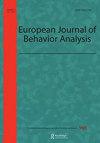Evaluating the utility of interview-informed synthesized contingency analyses in informing the treatment of problem behavior among children with autism spectrum disorder
引用次数: 1
Abstract
ABSTRACT Although functional analysis is a widely researched tool for determining behavioral function, traditional formats are associated with limitations that often preclude their incorporation into practice. The interview-informed synthesized contingency analysis (IISCA) was developed to address such limitations. This study investigated the effectiveness and efficiency of the IISCA in determining the function of problem behavior for three non-vocal children with autism spectrum disorder and intellectual disabilities in a school setting. The effectiveness of the skill-based treatment process associated with the IISCA was also evaluated, as were the acceptability of these treatment procedures and the fidelity with which they were implemented. The IISCAs yielded differentiated outcomes immediately for two participants and following a secondary analysis for the third participant. Assessment results informed the design of treatments involving functional communication training and delay- and denial-tolerance training evaluated using a changing-criterion design. Implications and limitations are discussed and recommendations for future research are offered.评估访谈信息综合偶然性分析在自闭症谱系障碍儿童问题行为治疗中的效用
虽然功能分析是一种被广泛研究的用于确定行为功能的工具,但传统的分析格式存在局限性,常常阻碍其应用于实践。访谈信息综合偶然性分析(IISCA)的发展就是为了解决这些局限性。本研究探讨了IISCA在确定三名患有自闭症谱系障碍和智力障碍的非发声儿童在学校环境中的问题行为功能的有效性和效率。还评估了与IISCA相关的以技能为基础的治疗过程的有效性,以及这些治疗程序的可接受性和执行的保真度。IISCAs立即对两名参与者产生了不同的结果,并对第三名参与者进行了二次分析。评估结果为包括功能性沟通训练和延迟和拒绝容忍训练在内的治疗设计提供了信息,使用变化标准设计进行评估。讨论了研究的意义和局限性,并对未来的研究提出了建议。
本文章由计算机程序翻译,如有差异,请以英文原文为准。
求助全文
约1分钟内获得全文
求助全文

 求助内容:
求助内容: 应助结果提醒方式:
应助结果提醒方式:


